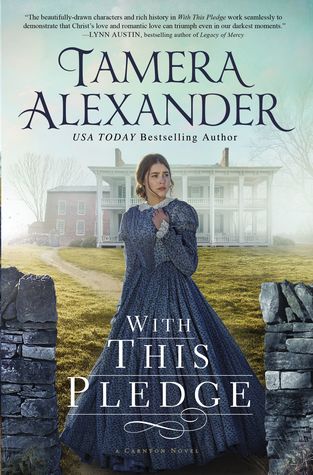 With the battle of Franklin happening within sight of its windows, Carnton Plantation is turned into a field hospital for the thousands of Confederate soldiers being mowed down in this decisive battle of the Civil War. Level-headed Lizzie Clouston, governess of the McGavock children, is drafted as a nurse, where she meets--and makes promises to--the soldiers at death's door. To one, she promises to send a message to his mother, and to Captain Roland Jones, she promises to keep the surgeon from amputating his leg--though without amputation, his chances of survival are slim. Though promised to another, Lizzie is drawn to Roland in a way she has never felt toward her fiance. Yet even without her fiance standing between them, their opposing morals promise to keep them apart--and Lizzie will do what is right, whatever the cost.
With the battle of Franklin happening within sight of its windows, Carnton Plantation is turned into a field hospital for the thousands of Confederate soldiers being mowed down in this decisive battle of the Civil War. Level-headed Lizzie Clouston, governess of the McGavock children, is drafted as a nurse, where she meets--and makes promises to--the soldiers at death's door. To one, she promises to send a message to his mother, and to Captain Roland Jones, she promises to keep the surgeon from amputating his leg--though without amputation, his chances of survival are slim. Though promised to another, Lizzie is drawn to Roland in a way she has never felt toward her fiance. Yet even without her fiance standing between them, their opposing morals promise to keep them apart--and Lizzie will do what is right, whatever the cost.I love it when stories are based on history, and this one is even more tied to it than most, being based almost entirely on historic and personal accounts--including love letters--of people at Carnton Plantation during the battle of Franklin and its aftermath, even the primary love story, which feels like a tale of fiction it's so beautiful and well-written. I was impressed by the strength and faith of Lizzie and the McGavocks, their generosity to those in need, and their honor in their dealings.
One thing, the story is bloody. How can it not be when in five hours nearly 2,000 Confederates were killed and another 5,000 gravely wounded? But if you've read Lynn Austin's Fire by Night or Jocelyn Green's Wedded to War, this is similar in depth of surgical detail, but from the unique perspective of a household that was given little say in becoming a hospital (and yet gave freely and generously anyway).
One of the most fascinating things about this story--as with the most well-written stories about the Civil War--is the moral dilemmas presented in it. The things that, viewed from a distance, seem black and white, yet when up close and personal, are heart-breakingly gray. We think of slave owners as evil, yet as Roland points out, he was taught to love the Lord by men who owned slaves. Did that make him, his father, and his grandfather evil, in spite of their otherwise upright natures? We rejoice because the battle of Franklin heralded the end of the war, and the end of slavery--both good things--yet what a cost . . . all those boys mowed down in an open field. Brothers, fathers, husbands, sons; saved and unsaved, morally upright or plain evil. None had a chance.
It reminds me of the last few chapters of the book of Judges--not so much because it, too, is essentially a civil war, but because for so long, men ignored what God says is right and instead did what was right in their own eyes. And when we do that, soon there is no good solution anymore. Wrongs are committed to right the original wrong in hopes that the ends justify the means, but ultimately, everyone loses. I think on that, the widows of both the North and the South would agree, as would the orphans, and the childless mothers.
In case you hadn't figured it out, it's quite the thought-provoking story; extremely well written, heart-wrenching yet inspiring at the same time. And it is the winner of the 2019 Christy Award for Best Historical Romance!
I received a complimentary copy of this book from Thomas Nelson through NetGalley. Opinions expressed in this review are completely my own.
Carnton
0.5: Christmas at Carnton
1. With This Pledge
2. Colors of Truth
Related Nashville Novels (contain some cross-over characters/connections to Carnton):
Belmont Mansion
1. A Lasting Impression
2. A Beauty So Rare
3. A Note Yet Unsung
Belle Meade Plantation
1. To Whisper Her Name
2. To Win Her Favor
2.5 "To Mend a Dream" (part of the novella collection Among the Fair Magnolias)
3. To Wager Her Heart
No comments:
Post a Comment